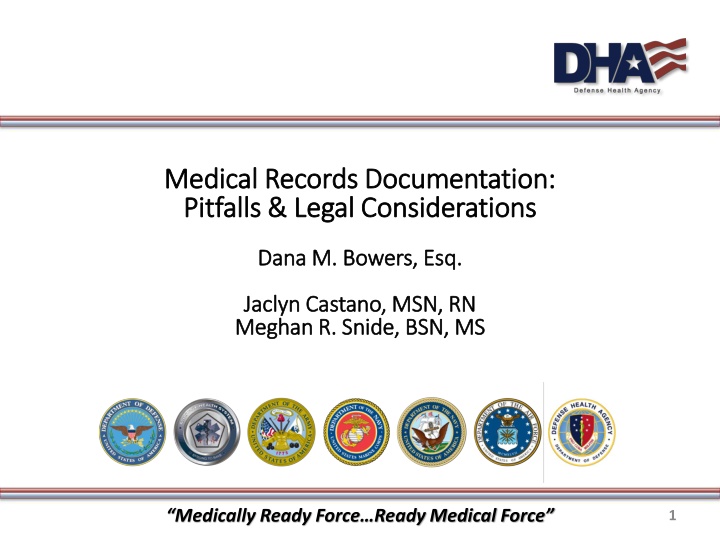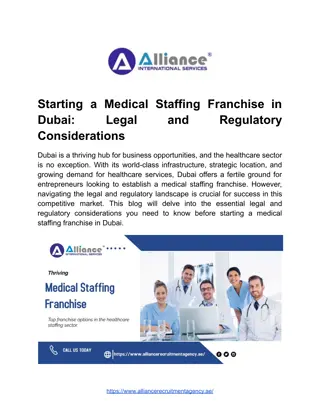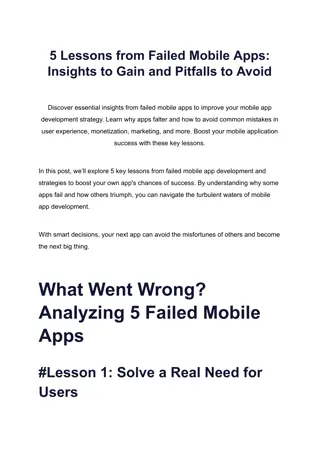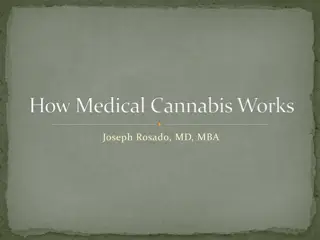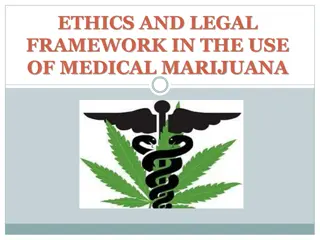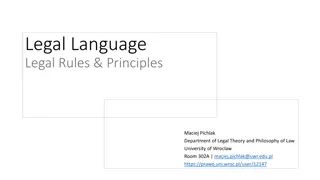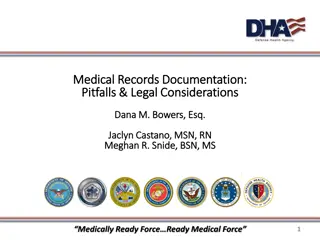Expert Insights on Medical Records Documentation Pitfalls and Legal Considerations
Explore expert insights from Dana M. Bowers, Esq., Jaclyn Castano, MSN, RN, and Meghan R. Snide, BSN, MS, on the challenges and legal aspects of medical records documentation. Dana Bowers provides legal counsel with a healthcare focus, while Jaclyn Castano and Meghan Snide bring valuable perspectives from patient safety and risk management roles in military medical settings. Gain key insights on navigating pitfalls and legal considerations in medical record keeping.
Download Presentation

Please find below an Image/Link to download the presentation.
The content on the website is provided AS IS for your information and personal use only. It may not be sold, licensed, or shared on other websites without obtaining consent from the author.If you encounter any issues during the download, it is possible that the publisher has removed the file from their server.
You are allowed to download the files provided on this website for personal or commercial use, subject to the condition that they are used lawfully. All files are the property of their respective owners.
The content on the website is provided AS IS for your information and personal use only. It may not be sold, licensed, or shared on other websites without obtaining consent from the author.
E N D
Presentation Transcript
Medical Records Documentation: Medical Records Documentation: Pitfalls Pitfalls & Legal Considerations & Legal Considerations Dana M. Bowers, Esq Dana M. Bowers, Esq. . Jaclyn Jaclyn Castano, MSN, Castano, MSN, RN Meghan R. Snide, BSN, MS Meghan R. Snide, BSN, MS RN Medically Ready Force Ready Medical Force 1
Presenter Presenter Dana M. Bowers Attorney-Adviser, Healthcare Law Office of General Counsel Defense Health Agency Walter Reed National Military Medical Center Bethesda, MD Medically Ready Force Ready Medical Force 2
Dana M. Bowers, Esq. Dana M. Bowers, Esq. Dana M. Bowers currently serves as Attorney-Advisor specializing in Healthcare Law for Walter Reed National Military Medical Center in Bethesda, Maryland. Her previous work experience includes serving as in-house counsel for West Virginia United Health System - an academic medical system located in Morgantown, West Virginia - where she provided legal counsel and litigation support to hospital staff regarding liability, medico-legal issues, licensure, and employment matters for System hospitals and associated clinics. Prior to that she practiced as a litigator in Chicago, Illinois for cases involving legal malpractice, construction negligence, industrial accidents, automobile accidents, insurance coverage, and premises liability. She received her undergraduate degree from the University of Florida in 2002, and her J.D. from Chicago-Kent College of Law in 2006. She is licensed to practice in Illinois and West Virginia. Medically Ready Force Ready Medical Force 3
Panel Members Panel Members Jaclyn Castano, MSN, RN Patient Safety Manager Madigan Army Medical Center - Tacoma, WA Meghan R. Snide, BSN, MS Chief, Risk Management Operations Air Force Medical Operations Agency - Falls Church, VA Medically Ready Force Ready Medical Force 4
Meghan R. Snide, BSN, MS Meghan R. Snide, BSN, MS Ms. Megan Snide is currently serving as the Chief of Risk Management Operations at the Defense Health Agency, located in Falls Church, Virginia. Ms. Snide has served on Quality Assurance and Risk Management Committees, on a Joint Commission on the Accreditation of Healthcare Organizations (JCAHO) Preparation Working Group and as a JCAHO Chapter Champion and within Risk Management Operations and the Quality Management Division within the DoD. In her current position, Ms. Snide is responsible for planning and implementing policy and programs regarding health care risk management for the Air Force Medical Services (AFMS), ensuring corporate compliance with federal, DoD and Air Force Regulation and as the principal advisor to the AFMS personal and Air Force Surgeon General (AF/SG). She also serves as a subject matter expert to support the AF/SG Trusted Care task force to implement principles and practices of high reliability across the AFMS. She received her Bachelor of Science in Nursing from the State University of New York located in Binghamton, New York and her Master of Science in Management from Troy State University, located in Troy, Alabama. Medically Ready Force Ready Medical Force 5
Jaclyn Castano, MSN, RN Jaclyn Castano, MSN, RN Ms. Jaclyn Castano is currently serving as the Chief of Patient Safety at Madigan Army Medical Center in Tacoma, Washington. Her previous work experience includes serving as the Clinical Nurse and Supervisor for nine years in the emergency department of this same hospital. During this time, Ms. Castano expanded her professional knowledge in the health care arena and exposed herself to different accrediting and regulatory agencies, further developing her leadership skills. Prior to this, Ms. Castano worked at Shady Grove Adventist Hospital in Maryland. She received her Bachelors of Science in Nursing from the Rochester Community and Technical College located in Rochester, Minnesota and her Masters of Science in Nursing and Nursing Education from Winona State University, located in Winona, Minnesota. She is currently licensed in the states of Washington and Maryland. Medically Ready Force Ready Medical Force 6
Disclosures Disclosures Dana M. Bowers, Meghan R. Snide, and Jaclyn Castano have no relevant financial or non-financial relationships to disclose relating to the content of this activity. The views expressed in this presentation are those of the author and do not necessarily reflect the official policy or position of the Department of Defense, not the U.S. Government. This continuing education activity is managed and accredited by the Defense Health Agency J7 Continuing Education Program Office (DHA J7 CEPO). DHA J7 CEPO and all accrediting organizations do not support or endorse any product or service mentioned in this activity. DHA J7 CEPO staff, as well as activity planners and reviewers have no relevant financial or non-financial interest to disclose. Commercial support was not received for this activity. Medically Ready Force Ready Medical Force 7
Disclaimer Disclaimer The materials and information provided during this training are for informational purposes only and not for the purpose of providing legal advice. Nothing in this presentation creates or is intended to create an attorney-client relationship, and is not a substitute for obtaining legal advice. Legal determinations are fact specific, but intended to assist with issue spotting. Consult with your agency counsel to obtain advice with respect to any particular issue or problem. Different agencies and services (including DHA, the U.S. Army/Navy/Air Force) have different regulatory guidance. Consult your agency-specific requirements. Licensed Individual Practitioners (LIPs) are subject to state specific guidance as well as guidance put forth by the U.S. Government and DoD. Medically Ready Force Ready Medical Force 8
Learning Objectives Learning Objectives At the conclusion of this activity, participants will be able to: 1. Review medical malpractice cases and how they are litigated 2. Discuss the role of the medical record in a litigation setting 3. Identify improper documentation and the negative impact it has on the outcome of patient care and litigation 4. Apply best practices to medical record documentation Medically Ready Force Ready Medical Force 6
Federal Tort Federal Tort Claims Act Claims Act (FTCA) (FTCA) Federal Tort Claims Act (FTCA) Medically Ready Force Ready Medical Force 7
Federal Tort Claims Act (FTCA) Federal Tort Claims Act (FTCA) Under the doctrine of sovereign immunity, you are not allowed to sue a government entity without its express permission. The Federal Tort Claims Act (FTCA) permits certain lawsuits against a federal government entity and federal employees who have acted within the scope of employment while causing injuries. The FTCA allows monetary compensation to be awarded when injuries are caused by wrongful (or negligent) actions of government employees. Negligent conduct that falls outside the scope of employment is not usually covered. Under the FTCA, the state medical malpractice laws that would normally apply are still in effect. See 28 USC 1346, 28 USC 2671, et. seq. Medically Ready Force Ready Medical Force 8
Federal Tort Claims Act (FTCA) Federal Tort Claims Act (FTCA) - Permits individuals to bring certain medical malpractice claims - the claim Administrative procedures must be followed to file - Claim must be filed within two years - Scope of claim depends on state law - FTCA applies to all medical records documentation created by a health care provider working in a medical treatment facility to include: Physicians Physician Assistants Nurses Pharmacists/Pharmacy Technicians Social Workers Psychologists Occupational Therapists Physical Therapists Kinesiotherapists Optometrists Case Managers Dentists Healthcare Executives And other health care professionals Medically Ready Force Ready Medical Force 9
Life of a Lawsuit Life of a Lawsuit Life of a Lawsuit Notice of Claim - If under the FTCA, file an Administrative Claim with the Federal Agency responsible for the alleged misconduct. Government has 6 months to respond to claim. Pleadings - Complaint filed by Plaintiff - Answer filed by Defendant - Other responsive pleadings Discovery - Interrogatories/RPDs/RFAs - Depositions Trial Medically Ready Force Ready Medical Force 13
Timeline The Life of a Lawsuit Alleged Negligence Occurs: December 1, 2019 Statute of Limitations Expires: 2 years ( or more!) Filed: December 1, 2021 Discovery: 18-24 months Completed: December 1, 2023 Trial Date: 6-8 months Completed: June 2024 - August 2024 Appeal: 1-1.5 years Completed: June December 2025 Retrial: 1-2 years Completed: June 2026-2027 ** Possible further delays (Lengthy Discovery, Nonsuit, Settlement Negotiations, Trial Delays, etc.) Medically Ready Force Ready Medical Force 14
Timeline The Life of a Lawsuit If act of medical negligence occurred on December 1, 2019 We would expect (using average timelines) that the case may not be completed until: June 2027! Medically Ready Force Ready Medical Force 15
Timeline The Life of a Lawsuit What were you doing June 2012? Medically Ready Force Ready Medical Force 16
Litigation Outcomes - Dropped - Dismissal - Settlement - Defense Verdict - Plaintiff s Verdict Medically Ready Force Ready Medical Force 17
Elements of a Medical Malpractice Case - Duty - Breach - Causation - Damages Medically Ready Force Ready Medical Force 18
Elements of a Medical Malpractice Case Duty Created By the Establishment of a Provider-Patient Relationship Breach Causation Damages Medically Ready Force Ready Medical Force 19
Elements of a Medical Malpractice Case Duty Breach The failure to follow the accepted standard of care applicable to the health care provider Causation Damages Medically Ready Force Ready Medical Force 20
Elements of a Medical Malpractice Case Duty Breach Causation The Defendant s actions were a proximatecause of the Plaintiff s injury. There is a causal relationship between a given physical condition and the defendant's negligent act. Damages Medically Ready Force Ready Medical Force 21
Elements of a Medical Malpractice Case Duty Breach Causation Damages $$$$ Includes both economic and non-economic Medical Malpractice Cap, if applicable (relies on State law) Medically Ready Force Ready Medical Force 22
Documentation Medically Ready Force Ready Medical Force 23
Importance Of Documentation: Why Does It Matter? - Legal document required by law - Patient safety - Used for implementing quality improvement initiatives - Used for utilization reviews and to obtain reimbursement - Used for research and education - Most credible evidence in legal proceedings Medically Ready Force Ready Medical Force 24
POLLING QUESTION #1: How many members of the audience have been involved in a lawsuit? As either a Plaintiff, Defendant, or Witness? - - Yes No Medically Ready Force Ready Medical Force 25
POLLING QUESTION #2: Of the people that answered yes How many found the process to be: (a) Fun, would love to do it again! (b) Ok, a learning experience. (c) Neutral. (d) HORRIBLE! but a learning experience. (e) I never want to do that again! (f) Please lawyers, go away. Medically Ready Force Ready Medical Force 26
Documentation & Medical Malpractice Litigation Medically Ready Force Ready Medical Force 27
Importance Of Documentation Plaintiff s goal in case is to identify through records (or lack of records) breaches of standard of care by practitioner that caused injury to patient. - Not concerned with what really happened - What is not in the record is fertile ground for plaintiff(s) - Create a case out of holes in the record - Examples: bed alarms, code sheets, monitoring strips, vitals Medically Ready Force Ready Medical Force 28
Importance Of Documentation: Considerations When drafting documentation memorializing patient care be FLAT : Factual Information Legibility Abbreviations Timeliness Medically Ready Force Ready Medical Force 29
When Drafting Documentation Be FLAT - Factual Information Concise and complete Credible Detailed Consistent Current Organized - Legibility - Abbreviations - Timeliness Feutz-Harter, Sheryl. Legal & Ethical Standards for Nurses. Eau Claire: PESI, 2006. Medically Ready Force Ready Medical Force 30
When Drafting Documentation Be FLAT - Factual Information - Legibility - Write clearly - Promptness is important but documentation must also be legible - If illegible, negative impressions of the author may form - Documentation must be legible for jurors during trial - Abbreviations - Timeliness Feutz-Harter, Sheryl. Legal & Ethical Standards for Nurses. Eau Claire: PESI, 2006. Medically Ready Force Ready Medical Force 31
When Drafting Documentation Be FLAT - Factual Information - Legibility - Abbreviations Unapproved or unknown abbreviations may lead to difficulty in interpreting information and subsequent patient harm may result - Timeliness Feutz-Harter, Sheryl. Legal & Ethical Standards for Nurses. Eau Claire: PESI, 2006. Medically Ready Force Ready Medical Force 32
POLLING QUESTION #3: What does the Abbreviation PE stand for: (a) Physical Exam (b) Partial Epilepsy (c) Pericardial Effusion (d) Pulmonary Embolism (e) Pre-Eclampsia (f) Pelvic Examination Medically Ready Force Ready Medical Force 33
POLLING QUESTION #4: What does the Abbreviation CP stand for: (a) Cerebral Palsy (b) Constrictive Pericarditis (c) Chronic Pain (d) Chest Pain (e) Command Post Medically Ready Force Ready Medical Force 34
When drafting documentation Be FLAT When Drafting Documentation Be FLAT - Factual Information - Legibility - Abbreviations - Timeliness > Information should be as time specific as possible > Relate activity to the time it occurred > Enter information into permanent sources promptly > Times must be accurate > Time specific documentation leads to increased accuracy and becomes important in litigation processes > By promptly recording information, other health care providers can be cognizant of patient developments Feutz-Harter, Sheryl. Legal & Ethical Standards for Nurses. Eau Claire: PESI, 2006. Medically Ready Force Ready Medical Force 35
Importance Of Documentation: Practical Applications Documentation Pitfalls: - Vague descriptions or explanations - Corrections To Correct or Delete an Entry: - Draw a line through the incorrect entry - Initial chart with date and time of correction - Add correct information with date and time of entry and reason for the change Late Entries: - When care was given? - When entry was made? - If significantly later, why? Medically Ready Force Ready Medical Force 36
Importance Of Documentation: Do and Don t > What: DO - Include factual and objective information only - Be clear, concise, and credible DO NOT - Do not include speculations - Do not include personal opinions - Do not let emotions creep into the medical record Medically Ready Force Ready Medical Force 37
Importance Of Documentation: Do and Don t > What: Patient rudely demanding more pain meds. When this nurse refused, patient became belligerent and refused to allow me to [medical treatment]. Patient is obviously a drug seeker. vs. Upon entering room, patient raised voice and stated give me more pain meds now! Informed patient that additional pain meds were not due until [time]. Patient then began shouting obscenities. Requested that patient permit me to [medical treatment], he refused. [Appropriate steps taken in response to refusal of treatment] Medically Ready Force Ready Medical Force 38
Importance Of Documentation: Do and Don t > When: DO - Chart should reflect the actual time the documentation was made - Document immediately after an observation, treatment, event, or assessment - Late entries should be made as soon as possible DON T - Do not make entries in advance - Do not pre-date or back-date entries Medically Ready Force Ready Medical Force 39
Importance Of Documentation: Do and Don t >Where: DO Keep all patient paperwork and other document in the approved medical record or other designated location. DON T Do not keep patient paperwork with other documents or outside of the approved medical record Do not document patient information other than on approved forms ** If you must write notes on scrap paper, transfer the information to the record as soon as possible and put the scrap paper in a confidential destruction bin immediately thereafter Medically Ready Force Ready Medical Force 40
Importance Of Documentation: Do and Don t > NEVER EVER: - Write vague descriptions - Alter or falsify a medical record - Use unacceptable abbreviations Medically Ready Force Ready Medical Force 41
POLLING QUESTION #5: THIS IS COMPLETELY ANONYMOUS: How many members of the audience have ever gone back to alter an electronic medical record without also documenting an explanation for the change? - Yes - No Medically Ready Force Ready Medical Force 42
Importance Of Documentation: Copy Forward Copy and paste or copyforward functionality can support efficiency during clinical documentation, but may promote inaccurate documentation with risks for patient safety. Do not call copy-forward a template. COPY FORWARD ASSOCIATED PROBLEMS: - Creation of new inaccuracies: Post-op Day 1 is repeated over, and over, and over for five weeks. - Rapid Propagation of Errors: Resolved condition is continuously renewed. - Internal Consistencies: afebrile v. fever in updated vitals - NoteBloat https://www.ncbi.nlm.nih.gov/pmc/articles/PMC5373750/ Medically Ready Force Ready Medical Force 43
POLLING QUESTION #6: THIS IS COMPLETELY ANONYMOUS: How many members of the audience use copy & paste or copyforward at least once a week? - Yes - No Medically Ready Force Ready Medical Force 44
Importance Of Documentation: Importance Of Documentation: Litigation Experience Litigation Experience - Memories fade (think of the medical record as time capsule) - What is not documented is usually more damaging than what is - (there is little risk in charting too much) - If it s not charted - it didn t happen - The little things can hurt big - Subjective words need context, use exact wording if possible - Juries/judges trust written documents over recollection and - testimony Medically Ready Force Ready Medical Force 45
POLLING QUESTION #7: How many members of the audience have ever served on a jury? - Yes - No Medically Ready Force Ready Medical Force 46
POLLING QUESTION #8: Of the people that answered yes Did the jurors rely more on: (a) Witness testimony (b) Written Documentation (c) Tangible Evidence (i.e. photos) (d) All of the above, equally (e) Other Medically Ready Force Ready Medical Force 47
Importance Of Documentation: Testimony - Litigation relies heavily on both documentation and witness testimony - If you are called to give testimony during a deposition or trial, you can ask to review and inspect your records - Changes to an electronic medical record can be tracked - It is important to maintain real-time documentation (i.e. photos, code sheets, monitoring strips) - Health Care Providers (HCPs) love to help people it transfers to your testimony Medically Ready Force Ready Medical Force 48
Key Take Aways Key Take Aways Medical record documentation is the most credible evidence in legal proceedings Litigating claims is a months if not year long process Memories fade Be FLAT in your documentation practices Be objective and clear Never alter or falsify a medical record Avoid Copy & Paste/ Copy Forward functions Medically Ready Force Ready Medical Force 49
Panel Discussion Dana M. Bowers, Esq. Jaclyn Castano, MSN, RN Meghan R. Snide, BSN, MS Medically Ready Force Ready Medical Force 50
